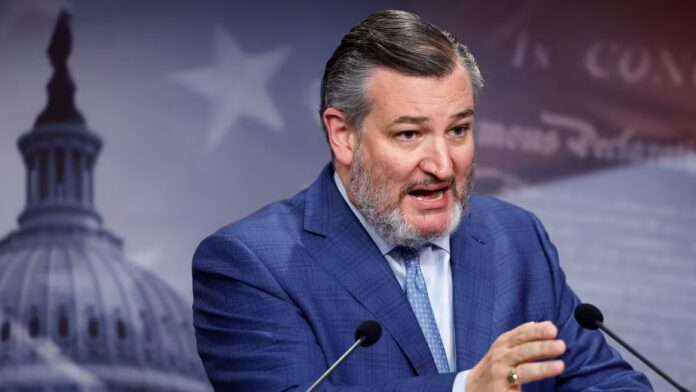United States Senator Ted Cruz has accused former President Joe Biden of failing to protect Nigerian Christians, saying his administration ignored what he described as widespread attacks by radical Islamist groups across the country.
Cruz, a Republican representing Texas, made the remarks on Wednesday in a post on his official X (formerly Twitter) account. He also praised President Donald Trump for restoring Nigeria’s designation as a “Country of Particular Concern” (CPC) — a label the U.S. government uses for nations accused of violating religious freedom on a large scale.
“Joe Biden turned a blind eye while radical Islamic terrorists slaughtered Christians in Nigeria. I’m very grateful to President Trump for designating it a Country of Particular Concern,” Cruz wrote.
The U.S. senator’s comment comes days after President Trump announced the reinstatement of Nigeria’s CPC status, citing ongoing violence against Christian communities and the Nigerian government’s alleged failure to protect religious minorities.
President Trump, who returned to office earlier this year, announced Nigeria’s redesignation as a Country of Particular Concern on his Truth Social platform last weekend. The move reinstated a status that had been removed in 2021 under the Biden administration.
In his statement, Trump said, “Thousands of Christians are being killed. Radical Islamists are responsible for this mass slaughter. I am hereby making Nigeria a ‘Country of Particular Concern.’”
He also warned that the U.S. would not “stand by while such atrocities are happening” and promised that his administration would take decisive action to defend Christian populations around the world.
The “Country of Particular Concern” designation is part of the U.S. International Religious Freedom Act, which empowers Washington to impose sanctions, restrict aid, or apply diplomatic pressure on governments accused of tolerating or committing serious violations of religious freedom.
Nigeria was first placed on the CPC list in 2020 during Trump’s first term, following reports of widespread violence by extremist groups such as Boko Haram, ISWAP, and Fulani militias targeting Christian communities in the North and Middle Belt. However, the Biden administration removed Nigeria from the list in 2021, a decision that drew criticism from several U.S. lawmakers, Christian advocacy groups, and human rights organizations.
Senator Cruz has long been vocal about religious persecution abroad and has frequently accused Democratic administrations of being slow to respond to human rights abuses. His latest criticism of Joe Biden reflects growing pressure among conservative lawmakers in Washington for stronger U.S. engagement on global religious freedom issues.
By praising Trump’s latest move, Cruz aligned himself with other Republican figures, including House Majority Whip Tom Emmer and Rep. Chris Smith, who have publicly supported measures to hold Nigeria accountable for alleged human rights violations.
Cruz’s message also underscores the partisan divide in U.S. foreign policy toward Africa. While Democrats often emphasize diplomatic engagement and humanitarian aid, Republicans like Cruz and Trump have pushed for sanctions and stronger action against governments accused of failing to protect religious minorities.
Nigeria, Africa’s most populous country, has faced rising insecurity over the past decade. In the North-East, Boko Haram and its splinter group, ISWAP, have carried out deadly attacks against both Christians and Muslims. In the Middle Belt and parts of the North-West, violent clashes between armed herders and farming communities have resulted in thousands of deaths and mass displacement.
Although these conflicts often have complex causes — including competition over land, ethnic tensions, and poverty — many international observers, especially in Western countries, have framed them as religiously motivated attacks against Christians.
Human rights organizations such as Amnesty International and Open Doors USA have repeatedly listed Nigeria among the most dangerous countries in the world for Christians. In 2024, Open Doors ranked Nigeria sixth on its “World Watch List” of nations where Christians face severe persecution.
However, Nigerian authorities have often rejected claims of a religious genocide. The Federal Government maintains that the country’s security challenges are not driven by religion but by criminality, terrorism, and socio-economic factors.
The Nigerian government has repeatedly dismissed U.S. allegations of religious persecution. Speaking earlier this week, Minister of Information and National Orientation Mohammed Idris said that claims of a “Christian genocide” in Nigeria were “misleading and politically motivated.”
“Our security challenges are complex and multifaceted, but they are not about religion. Both Christians and Muslims have suffered from terrorism, banditry, and insurgency,” the minister said.
President Bola Tinubu has also highlighted his administration’s commitment to protecting freedom of worship. In a previous statement, Tinubu said, “Nigeria stands firmly as a democracy guided by constitutional guarantees of liberty and equality for all faiths. Tolerance and peaceful coexistence remain at the heart of our national identity.”
Despite these assurances, U.S. lawmakers and advocacy groups continue to pressure Washington to take a tougher stance, arguing that thousands of Nigerian Christians remain vulnerable to attacks.
Trump’s decision to redesignate Nigeria as a Country of Particular Concern has reignited debate among diplomats, faith leaders, and policy analysts. Supporters argue that the move will compel the Nigerian government to act more decisively against extremist groups. Critics, however, warn that it could strain U.S.-Nigeria relations and complicate cooperation in areas such as trade, defense, and counterterrorism.
For Nigeria, the CPC designation could lead to increased scrutiny of its human rights record and potentially affect foreign investment if sanctions or aid restrictions are introduced.
Meanwhile, advocacy groups like Intersociety and Christian Solidarity Worldwide have welcomed the U.S. move, calling it “a step toward justice for victims of religious violence.”

